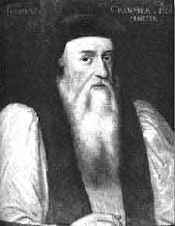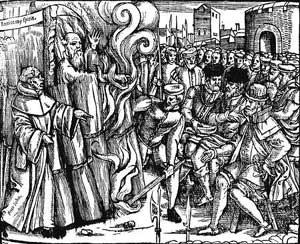Readings:
Psalm 119:73-80
Romans 11:13-24
Luke 2:25-35Preface of God the Son
[Common of a Martyr]
[Common of an Arist, Writer, or Composer]
[Common of a Pastor]
[Of the Holy Cross]
[For Artists and Writers]
PRAYER (traditional language)
Merciful God, who through the work of Thomas Cranmer didst renew the worship
of thy Church by restoring the language of the people, and through his
death didst reveal thy power in human weakness: Grant that by thy grace
we may always worship thee in spirit and in truth; through Jesus Christ,
our only Mediator and Advocate, who livest and reignest with thee and
the Holy Spirit, one God, for ever and ever. Amen.
PRAYER (contemporary language)
Merciful God, through the work of Thomas Cranmer you renewed the worship
of your Church by restoring the language of the people, and through his
death you revealed your power in human weakness: Grant that by your grace
we may always worship you in spirit and in truth; through Jesus Christ,
our only Mediator and Advocate, who lives and reigns with you and the
Holy Spirit, one God, for ever and ever. Amen.
Return to Lectionary Home Page
Webmaster: Charles Wohlers
Last updated: 23 Jan. 2016
This commemoration appears in Lesser Feasts & Fasts 2018 with revised lessons.
THOMAS CRANMER
ARCHBISHOP OF CANTERBURY AND MARTYR, 1556
When Henry the Eighth of England died, he left three heirs: his son Edward and his two daughters, Mary and Elizabeth. Edward succeeded to the throne and was a staunch Protestant (or at least his advisors were). Under his rule, the church services, previously in Latin, were translated into English, and other changes were made. When Edward died, the throne passed to his sister Mary, who was firmly Roman Catholic in her beliefs. She determined to return England to union with the Pope. With more diplomacy, she might have succeeded. But she was headstrong and would take no advice. Her mother had been Spanish, and she determined to marry the heir to the throne of Spain, not realizing how much her people (of all religious persuasions) feared that this would make England a province of the Spanish Empire. She insisted that the best way to deal with heresy was to burn as many heretics as possible. (It is worth noting that her husband was opposed to this.) In the course of a five-year reign, she lost all the English holdings on the continent of Europe, she lost the affection of her people, and she lost any chance of a peaceful religious settlement in England. Of the nearly three hundred persons burned by her orders, the most famous are the Oxford Martyrs, Hugh Latimer, Nicholas Ridley, and Thomas Cranmer.
 Thomas
Cranmer was Archbishop of Canterbury in the days of Henry, and defended
the position that Henry's marriage to Katharine of Aragon (Spain) was
null and void. When Edward came to the throne, Cranmer was foremost in translating
the worship of the Church into English (his friends and enemies agree
that he was an extraordinarily gifted translator) and securing the use
of the new forms of worship. When Mary came to the throne, Cranmer was
in a quandary. He had believed, with a fervor that many people today will
find hard to understand, that it is the duty of every Christian to obey
the monarch, and that "the powers that be are ordained of God" (Romans
13). As long as the monarch was ordering things that Cranmer thought good,
it was easy for Cranmer to believe that the king was sent by God's providence
to guide the people in the path of true religion, and that disobedience
to the king was disobedience to God. Now Mary was Queen, and commanding
him to return to the Roman obedience. Cranmer five times wrote a letter
of submission to the Pope and to Roman Catholic doctrines, and four times
he tore it up. In the end, he submitted. However, Mary was unwilling to
believe that the submission was sincere, and he was ordered to be burned
at Oxford on 21 March 1556. At the very end, he repudiated his final letter
of submission, and announced that he died a Protestant. He said, "I have
sinned, in that I signed with my hand what I did not believe with my heart.
When the flames are lit, this hand shall be the first to burn." And when
the fire was lit around his feet, he leaned forward and held his right
hand in the fire until it was charred to a stump. Aside from this, he
did not speak or move, except that once he raised his left hand to wipe
the sweat from his forehead.
Thomas
Cranmer was Archbishop of Canterbury in the days of Henry, and defended
the position that Henry's marriage to Katharine of Aragon (Spain) was
null and void. When Edward came to the throne, Cranmer was foremost in translating
the worship of the Church into English (his friends and enemies agree
that he was an extraordinarily gifted translator) and securing the use
of the new forms of worship. When Mary came to the throne, Cranmer was
in a quandary. He had believed, with a fervor that many people today will
find hard to understand, that it is the duty of every Christian to obey
the monarch, and that "the powers that be are ordained of God" (Romans
13). As long as the monarch was ordering things that Cranmer thought good,
it was easy for Cranmer to believe that the king was sent by God's providence
to guide the people in the path of true religion, and that disobedience
to the king was disobedience to God. Now Mary was Queen, and commanding
him to return to the Roman obedience. Cranmer five times wrote a letter
of submission to the Pope and to Roman Catholic doctrines, and four times
he tore it up. In the end, he submitted. However, Mary was unwilling to
believe that the submission was sincere, and he was ordered to be burned
at Oxford on 21 March 1556. At the very end, he repudiated his final letter
of submission, and announced that he died a Protestant. He said, "I have
sinned, in that I signed with my hand what I did not believe with my heart.
When the flames are lit, this hand shall be the first to burn." And when
the fire was lit around his feet, he leaned forward and held his right
hand in the fire until it was charred to a stump. Aside from this, he
did not speak or move, except that once he raised his left hand to wipe
the sweat from his forehead.
 |
| The martyrdom of Thomas Cranmer, from an old edition of Foxe's Book of Martyrs |